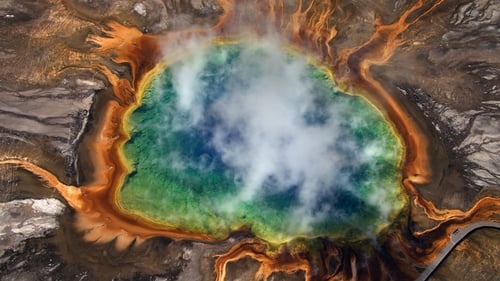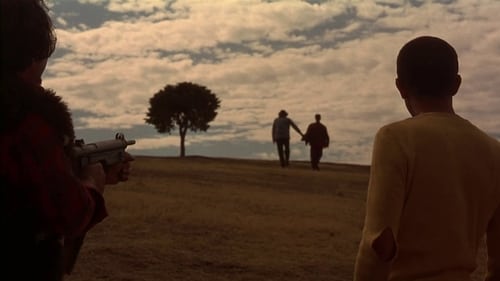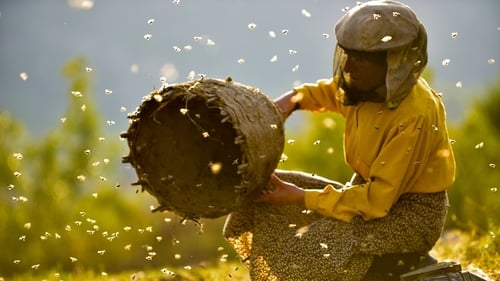Panorama of the City of Grevena (1911)
장르 : 다큐멘터리
상영시간 : 1분
연출 : Janaki Manaki, Milton Manaki
시놉시스
Early Balkan footage.

45억년의 진화를 거친 지구에게 우리는 감당하기 힘들 정도의 충격을 가하고 있다. 과도하게 소비하고 있으며 지구의 자원을 고갈시키고 있다. 하늘에서 볼 때, 지구의 상처는 명백히 드러난다. 은 지구의 상처를 꾸밈없이 보여주고 그 해결책을 제시한다. 그리고 이 영화는 한편으로 우리의 능력을 보여준다. 환경에 맞추어 바뀌거나, 환경을 바꾸는 능력을. 이 영화의 부제는 “비관론에 빠져있을 시간이 없다”라고 할 수 있다. 우리는 우리의 세계를 바꾸어놓을 중요한 선택의 기로에 서있다. 자, 그렇다면 이제 어느 쪽으로 우리의 능력을 발전시킬 수 있을까?

성당에서 침묵의 서약을 한 젊은 수도사 키릴은 쫓기고 있는 알바니아 소녀 자밀라를 숨겨주지만 그녀의 말조차 알아듣지 못한다. 어느새 그녀는 그의 마음 속에 자리잡게 되고 무장한 사내들이 그녀를 찾아 성당을 기습할 때도 그는 자신의 평화를 깨트릴 위험에 빠지게 됐다는 사실조차 잊어버린다. 한편 사진편집인 앤은 남편 닉과 종군 사진작가 알렉산더 사이에서 사랑의 갈등을 겪게 되고 알렉산더는 마음의 평화를 찾기 위해 고향으로 돌아간다. 하지만 어느새 그곳도 전쟁의 기운에 휩싸여 있다. 어느날 과거의 연인이었던 안나가 자신의 실종된 딸을 찾아달라고 부탁하자 그는 카메라를 통해서 경험했던 민족분규를 경험하게 된다.

마케도니아의 어느 산골 마을에 늙은 어머니와 함께 살아가는 아티제는 매일 돌산을 넘으며 자연이 허락하는 만큼의 소산물을 얻는다. 지루하지만 능숙한 그녀의 움직임을 따라 자연이 펼쳐지고 그녀가 벌을 다루며 꿀을 얻는 방식에서 조화롭게 사는 삶의 태도를 목격하게 된다. 그녀의 옆으로 새로운 이웃들이 찾아온다. 그들은 아티제의 지혜와 조언에 따라 그녀가 고수하는 전통적 방식을 배우려 노력하지만 그들의 욕망에 비해 자연은 턱없이 부족하기만 하다. 결국, 서로 다른 삶의 방식은 대립하고 아티제의 꿀벌마저 위기에 놓인다.

As Macedonia faces its difficult transition, a boy escapes into a world of his own creation.

Godina was ordered to make a short film glorifying the army, but instead made a film about making love, not war. The censors hacked it up, but he managed to save one complete copy.

A group of crotchety codgers attempt to revive the punk-rock band they all played in 17 years earlier in "Punk Is Not Dead".

A group of Macedonian partisans are hiding away in the mountains from Bulgarian fascist authorities that occupy Macedonia.

A mild political satire about a peculiar friendship between a lonesome monkey and an (impoverished) zoo warden, and about an upside-down world in transition as seen by a chimpanzee.

Serafim is a vampire hunter - who wanders through Macedonian villages and destroys the vampired dead man for money. His apprentice is young fellow named Fidan, who Serafim teaches the rough and dangerous vampire craft, along with the alphabet and the insecure life in Macedonia. Vampire man and his student in their surroundings get in struggle with: Macedonian vampires, Turkish Authority and with Komiti (Macedonian Revolutionaries), also with Avdzi - Taburi (paid hunters of Komiti). Fidan experiences damnation of the vampire skill, who doesn't know if Serafim is a God's angel or servant of Devil.

A schoolclass in seen outside in Macedonia.

A short film that contains short clips of the fishing method.

A group of Macedonian women are shown hard at work.

This film was made on the occasion of the celebration of the 20th anniversary of the Ilinden (St. Ellias Day) Rebellion. This panoramic film depicts the most significant historic figures and places situated in the Aegian, Pirin and Vardar regions.

Early Balkan footage.

After losing his job on the first day of school, an idealistic teacher attempts to get rehired by locking his students in the classroom and forcing them to resolve a long-standing feud between their villages.

The first Macedonian Movie from 1952- Frosina is one of the many Macedonian wives whose husbands are economic emigrants abroad. Marriage does not bring them a family, only the burden of life itself. After her husband's short visits, she gives birth to children who do not live long because of the poverty into which they have been born. She gives birth to them alone, and she buries them alone. Only her last child, Klime, survives all his various illnesses and grows up to be her one joy in life. The war breaks out...

A six minute film of the funeral of the murdered Metropolitan Emilianos of Grevena, of which all has been lost, save for 17 seconds. Emilianos was murdered on October 1st, 1911.

The story takes place in March of 1943 during transportations of Jews from Skopje. Nikola is a surgeon who was taken his working license away, and spends evening hours at the local bar where German officers, along with Bulgarian officer Simeonov, play Russian roulette with their gun pointed at prisoner's head. After suicide of one German mayor, Nikola and the prisoner escape.

"Skoplje '63" is a 1964 Yugoslavian documentary film directed by Veljko Bulajić about the 1963 Skopje earthquake (Skoplje, per film title, is the Serbo-Croatian spelling of Skopje). The filming started three days after the earthquake and lasted for four months. After that, Bulajić spent 12 months editing the footage at Jadran Film studios.

The mocumentary about famous clockmaker Dragan Saldziev in Skopje.













